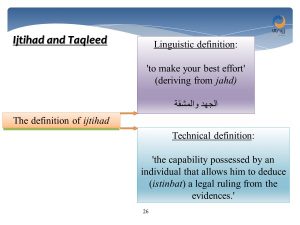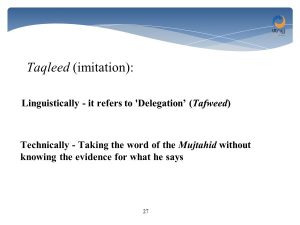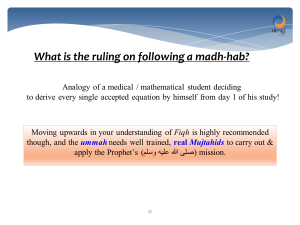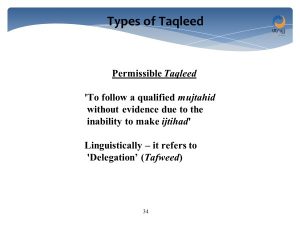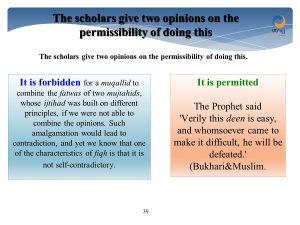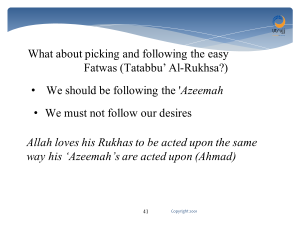Why Scholars Differ (part 4) – What are Ijtihad and Taqleed?

Ijtihad (reasoning) and Taqleed (imitation)
Do I need to follow a madhab? Who is qualified to make Ijihad? What essential knowledge does a mujtahid need?
Definition
While Ijtihad is the process of systematic legal reasoning carried out only by mujtahids (those trained in ijtihad), taqleed is to follow a certain school, or scholar or opinion. The person who does taqleed is called a muqalid.
By default anyone who is not a mujtahid is muqalid.
There is a very limited number of people who are mujtahids, as it is very specialised and anyone who is a mujtahid, cannot be a muqalid.
Not all the companions were mujtahids. Of course not! Were all the companions scholars? No, just a limited number of them could give fatwas.
In particular Abdullah ibn Masoud, Omar bin al Khattab, Abu Bakr, Ali bin Abi Talib, Zayd bin Thabit and Obay bin Kaab and Abu Musa al Ash’ari were the muftis (scholars) among the companions. They were ones that the companions consulted in the absence of the Prophet (peace be on him).
Ikhlas and Taqwa – the Keys of Divine Knowledge
Throughout history, we have the same in every generation, those who are gifted and able to carry out ijtihad. And with more ikhlas (sincerity) they could sharpen their skills. As Allah Almighty stated:
Fear Allah and Allah will teach you. (2:282)
One of the sources of knowledge which they do not teach you in university is taqwa (obedience)
The story of Musa and Khidr (peace be on them) in Surah Kahf is the illustration of this. Allah Almighty sent Musa (peace be on him) to learn from Khidr. Even though the status of Musa was higher (as he was a Messenger, whereas the majority of scholars believe that Khidr was a prophet). Yet the description of Khidr which Allah gave us is:
One of our servants we have given from our mercy to him and we have taught him a special knowledge. (18:66)
This is called ilm la dunee (divine knowledge) which Allah Almighty gifts to certain people. It is not from college or university.
Act with taqwa and Allah Almighty will teach you.
Dangers of Ignorance and arrogance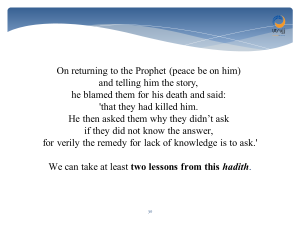
Jabir bin Abdullah (may Allah be pleased with him) said:
We set out on a journey. One of our people was hurt by a stone, that injured his head. He then had a wet dream. He asked his fellow travellers: Do you find a concession for me to perform tayammum? They said: We do not find any concession for you while you can use water. He took a bath and died. When we came to the Prophet (peace be on him), the incident was reported to him. He said: ‘They killed him, may Allah kill them! Could they not ask when they did not know? The cure for ignorance is to ask. It was enough for him to perform tayammum and to pour some drops of water or bind a bandage over the wound ; then he should have wiped over it and washed the rest of his body’. (Abu Dawoud)
So the wrong fatwa can kill. And the Prophet (peace be on him) made du’a for Allah Almighty to kill them. Though the Prophet (peace be on him) did not literally mean that they should be killed, it was an expression of his anger that they had put themselves in the position of delivering a fatwah without the requisite knowledge. Had they said they did not know, it would have been better for them and their companion. Yet he died due to their ignorance.
The remedy for ignorance is to learn or to ask. Know your limits. Don’t be arrogant. Some people ask me about black holes, I don’t know, I’ve never been there before!
So the two lessons are that it is important to learn and not to put yourself in the wrong position.
So often people say I know better than any Shaykh. Why do I need to attend any circle? I have Google. You will be resurrected with Google then. This knowledge is divine and has been passed down from chest to chest over the generations til we got it. We take it for granted but this is the way we authenticated, preserved and nourished this knowledge and it nourished us as well.
Knowledge is not about the accumulation of books and databases. Knowledge is beyond this:
The truth has light. (Abu Dawood)
There is a special light with the truth. We have a beautiful poem in Arabic, which says:
Knowledge is not about the accumulation of books – you have many of them. The chicken has feathers but cannot fly.
The Reward for Ijtihad
Usually it was the judge who is in the position of ijtihad and if made the correct decision he would get double reward, if he was mistaken he would get one reward for trying. Some narrations said that being correct would earn 10 rewards and This is against the odds. In shariah if anyone commits a mistake there is a penalty. So why is there a reward for a mistake? If he is punished for a mistake, no one will do ijtihad again out of fear. So Allah wants ijtihad to happen, even if we get it wrong, as long the mujtahid has the right qualities and qualifications.
Sadly these days, those without the right qualities and qualifications jump to do ijtihad without the necessary ability.
Types of Mujtahid
There were three kinds of ijtihad: Mujtahid mutlaq (absolute) , muqayad (restricted), and mujtahid juzz’i (only in some matters).
Some are still in action and practice. In Imam Abu Hanifa and Malik’s time, it was possible for the mujtahid to cover everything – all the topics of Islam. But not anymore now. We no longer have mujtahid mutlaq as they used to do ijtihad in everything.
What is Mujtahid in madhab?
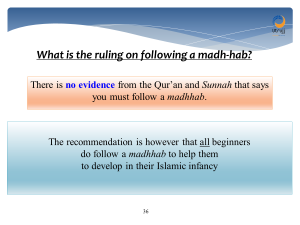
Within the same school the mujtahid would renew the religion and give new opinions and choices. For example, Alama Leknawi, the Indian Alama is a Hanafi scholar but has his own ijtihad in the Hanafi school. Not every Hanafi accepts his fatwas because it is against the common fatwas which we are familiar with, so they reject some of his ijtihad, but he was a great muhadith. And similarly we have other mujtahids in other schools, like Ibn Abdul Bar Andalucian scholar in the Maliki school in the 4-5th Hijri.
Our late Shaykh Professor Wahba Zuhayli in our time and Professor Azzam in our time.
Ijtihad is still in existence but needs the right qualities, understanding and teachers.
Some of the Characteristics of Mujtahids
There is a long list. Number one is taqwa, because it is the deen of Allah, which He prescribed for us a way of life.
You need to have be free of open sins. No one can guarantee they are free from sins, but open sins shouldn’t be on the list. So called mujatihid’s who don’t pray and go to the pub call themselves mujtahids and are funded by universities or governments or secret services and have followers. They are popping up like popcorn in different parts of the world.
Understanding the Arabic language is crucial. All the texts are Arabic. So if you do ijtihad when you have so many mistakes in your recitation of Fatiha, it is not acceptable.
The one who says they have understood something from the text that the companions hadn’t understand reveals how ignorant he must be. You cannot understand more than the Arabs during the time of the revelation. You cannot teach Shakespeare how to speak English! And you can’t teach Arabs how to understand their own language.
What a mujtahid needs to know:
- Some scholars say that mujtahids should have memorised the whole Qur’an, but at the very least they need to have memorised the verses of ahkam (rulings). There are two types of verses in the Qur’an – those with rulings and those without. (We have specialised tafsir books in ayat ul ahkam. The book Alam al Jassas which is 3 volumes is one of the best books on this topic. These books collate in each chapter the evidences for the topics, such as tahara, salah, siyyam etc.)
- They need to know what is nasikh and mansukh. i.e. the ayahs which were abrogated. This are not too many, but they are very important.
- They should know usool ul fiqh. Without knowing what is aam (general) and khas (specific), muqayad (restricted) and mutlaq (absolute), etc.
- They also need to know usool ul hadith, so that they know which hadith are authentic and which are not. One of the main criticisms against al Ghazali is that he had many non-authentic hadith in his books. He was a great scholar but he was not a muhadith. He even had fabricated hadith in his books. So you need to read ihya in conjunction with Iraqi and Zabeedi who checked all the hadith and made a commentary to verify them.
- They need to know the relevant modern sciences – if they are going to pass judgement on something, they need to understand the subject, whether it is psychology or finance or science etc.
- They need to understand reality in general- not an idealised version of an Islamic country, or a remote place, or a historical time but present day.
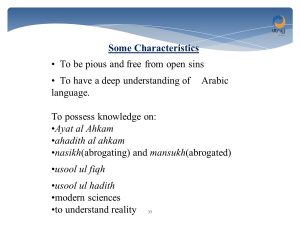
Collective ijtihad?
Collective ijtihad has been done by specific councils for ijtihad. It’s not one person’s opinion, but a gathering of scholars who come together to discuss new issues and they have plenty of discussions. This fills a big gap in the needs of the community. Many publications are Arabic, but there are some in English, such as by the European Council for Fatwa and research.
Who does Taqleed?
By default those who can’t do ijtihad do taqleed. The companions did taqleed. There is no in between state – you are either mujtahid or muqalid. Knowledge seekers are muqalid.
My Madhab or the Highway 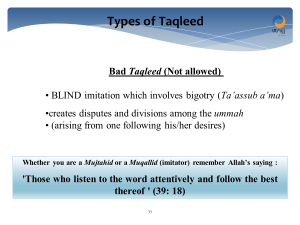
We have different types of taqleed – blind taqleed, which is bad, and leads to bigotry and sectarianism. It is quite common.
Different fiqhi meetings and councils often have this problem where certain shuyukh (even those who are talented, and well educated) stick rigidly to their madhab and refuse to accept any valid opinion from another school.
If the opinion is outside their Hanafi school, then they are not interested in another opinion, which serves the community and solves their problems.
They feel that the community is expecting a Hanafi response to their problem and it would betray them. More often that not, the community knows nothing about the Hanafi school except that they pronounce the basmallah out loud! (And the wudu issue)
Serving the community is not about sticking to a school but sticking to shariah. As long as you are sticking to shariah, the solution is from the Qur’an and Sunnah.
However, from personal experience, there are times when the fiqh councils hit a brick wall and the meetings don’t reach any conclusion.
If one opinion is not serving the purpose and needs of the community, don’t be rigid, take another opinion which is authentic and reliable. Why not?
It is not about following whims and desires, but the shariah which we are following. As the Qur’an says:
Those who listen to the word attentively and follow the Messenger. (39:18)
Don’t do blind taqleed. And don’t reject schools and make up your own school.
Is it an obligation to follow a Fiqhi School?
There is nothing in Qur’an and Sunnah that says you have to follow a particular school. There is nothing like that.
And all the verses in the Qur’an which refer to‘hanif’ and ‘hanifa’ have nothing to do with the Hanafi school of thought!
There is no evidence which dictates that it is an obligation to follow a school, but nevertheless it is a recommendation for beginners who are lost. You can’t tell them to deduce their own rulings from Qur’an and Sunnah. They can barely recite the Qur’an, so we say join whatever is local and available – whichever it might be.
We used to have a Shafi friend and the majority of us were Hanafi and we would keep inviting him, but wouldn’t join in, in case it conflicted with his school, but he knew very little of his own school and consequently became more ignorant.
Follow authentic knowledge and when you are more knowledgeable you can explore and learn about other schools.
Later on with the right qualities, and qualifications you can become a part-mujtahid.
However, you can’t just jump into PhD when you don’t know the alphabet.
Therefore it is recommended to stick to one school in the beginning.
Are we allowed to mix between two schools?
This is called talfeeq in Arabic. It is like sewing two things together. So can we patch them together? There are different opinions whether this is allowed. Some say it is permissible with limits and conditions. Others say it is not permissible because it can take you outside both schools.
For example, if you have an injury and blood comes out it, it breaks your wudu, unless you are Shafi, and then it does not break your wudu. So you adopt this opinion and then kiss your wife. In the Shafi school, touching your wife breaks your wudu. So if you have taken the Shafi opinion and the Hanafi opinion collectively on the same issue, you have ended contradicting yourself. You have no wudu according to both schools.
At different times you can follow the different schools, but not simultaneously on the same matter. It goes against common sense.
Thus we have scholars who say it is contradictory, and those who say it is permissible but do not make it a norm. In circumstances where you have difficulty, and you might lose your salah because you cannot make wudu, then use this accordingly, but not habitually. As the Prophet (peace be on him) always wanted to make life easy for people. Do not use the culture of ease to adopt a practice that is not optimal.
Combining Salah
For example, combining between prayers. In the Hanafi school you don’t combine salah, with the exception of hajj, behind the imam of hajj. Otherwise the salah in the Hanafi school would not be valid. In other schools, you can combine prayers if you are travelling or ill. So they have conditions for combining. In this day and age it is difficult to pray on time, so if the you will miss your salah unless you combine, we have an authentic narration that the Prophet (peace be on him) combined salah when he was not travelling. But was this the normal Sunnah or an exceptional Sunnah? It was exceptional. So do not make it a norm. You are allowed, but you break the blessings of the sequence of salah. If Allah Almighty had wanted to make salah three times a day, He would have made it three times a day. There is a significance in the fact that Allah Almighty commanded five prayers a day.
Wiping over socks
Some brothers wear leather socks 365 days a year. They say they are doing this because it is the Sunnah. The Sunnah is to wash your feet. The Prophet (peace be on him) only wiped over leather socks when it was very cold in winter. The rest of year he would wash his feet. So do not misapply the Sunnah. The application and understanding go together.
We ask Allah Almighty to teach us and enable us to understand and apply the Sunnah correctly.
We have the concept of rukhsah (removal of difficulty) in shariah, which is the permission to do exceptional acts at certain times. And we have azeemah which is the general rule. We need to stick the azeemah rather than the rukhsah and use the rukhsah when it is necessary. In some narrations the Prophet (peace be on him) said do not reject the rukhsah to make things difficult for you.
Fiqh Councils
We have the following Fiqh Councils around the world: 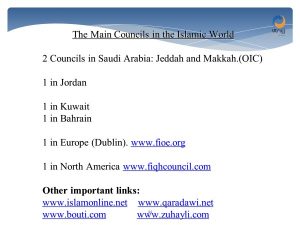
Course delivered by Shaykh Haytham Tamim on 2nd February 2019 at the Muslim World League.
Related Posts
Why Scholars Differ – Definitions of Shariah and Fiqh
The Origins of the Four Schools of Thought
The Differences between the Four Schools of Thought
Renewing the Deen – Recognising False Claims
Recommended Posts

The truth is more powerful than lies
July 26, 2024

Does a bride’s wali have to be Muslim?
July 25, 2024

